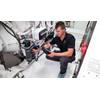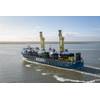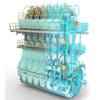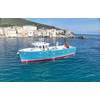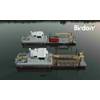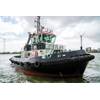First Nuclear-Powered Carrier Completes Last Deployment
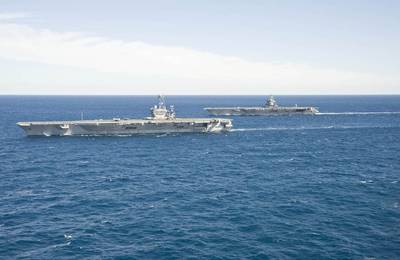
The aircraft carrier USS Enterprise (CVN 65) passes the aircraft carrier USS Harry S. Truman (CVN 75) in the Atlantic Ocean. (U.S. Navy photo by Naval Aircrewman (Tactical Helicopter) 3rd Class Matt Ballard/Released)
“Nearly everything that can be said about this ship must be done in superlatives or in terms of the first, the largest, the fastest, greatest striking capability and highest operational flexibility.” - Secretary of the Navy John Connally, USS Enterprise commissioning ceremony, Nov. 26, 1961
The USS Enterprise (CVN 65) is used to being first, biggest, fastest, and best. Now she can add “last” to her impressive list of accomplishments, as she has returned to her homeport of Norfolk, Va., for the final time. She completed her 22nd and final overseas deployment on Nov. 4, 2012.
At 51-years of age, the “Big E” is the longest currently serving ship in the fleet. She was the world’s first nuclear powered aircraft carrier. At 1,123 feet in length and a displacement of 94,000 tons, she is the longest and the largest ship in the Navy up until her decommissioning.
She steamed 80,968 miles during her 238 day deployment, and her airwing—Carrier Air Wing 1 (CVW-1)—flew more than 8,000 sorties while in the FIFTH and SIXTH Fleet areas of operations.
For Enterprise, last was not least. "This has been a full-on combat operation. We've seen the full spectrum of Navy operations on this deployment,” said Rear Adm. Ted Carter, the Enterprise Carrier Strike Group commander.
“Nearly everything that can be said about this ship must be done in superlatives or in terms of the first, the largest, the fastest, greatest striking capability and highest operational flexibility,” said Secretary of the Navy John Connally at her commissioning ceremony on Nov. 26, 1961.
“This year marks the beginning of an epoch in our Navy, for this is the year we added nuclear powered surface ships to our fleet,” Connally said.
“Nuclear power in surface warships gives them the ability to operate continuously at high speed which affords them protection not available to nonnuclear ships. This can mean the difference between winning and losing battles. As the number of our advance bases decreases and the size of the Fleet shrinks, the need for ships independent of the logistics umbilical cord for propulsion fuel will continue to increase,” said Vice Adm. Hyman G. Rickover, director of the Navy’s nuclear propulsion program, in a 1971 letter to Congress he wrote while at sea on Enterprise after her refueling.
Her decommissioning and inactivation ceremony is planned for Dec. 1. Thousands of former crewmembers and other well-wishers are expected at the ceremony, which will be her last official, public event.
Veterans of the World War II carrier USS Enterprise (CV 6), who served from 1938 until 1947, attended the 1961 commissioning, and some are expected to be at the CVN 65 decommissioning. According to Harrison Weldon, president of the USS Enterprise Association in 1961, the veterans wanted “to pass along the incredible luck of our ship to the new one.”
"The crew is very mindful that we are following the legacy of the more than 200,000 Sailors who have come before us during the last 50 years," said Capt. William C. Hamilton, the last commanding officer of Enterprise. "It's the Sailors of this great warship, and the Sailors that have served aboard Big E over the past half-century that have established the legacy she enjoys."
After the ceremony, her eight nuclear reactors will be removed and the ship dismantled.
INACTIVATION CEREMONY
December 1, 2012
1:00 p.m.
The Inactivation Ceremony will be the last official and public event in ENTERPRISE's legendary history.
Enterprise veterans, their families, shipyard workers, and friends are invited to register to attend the inactivation week events and the ceremony on the ship's website, www.enterprise.navy.mil. Tickets to the events will be on a first available basis.



